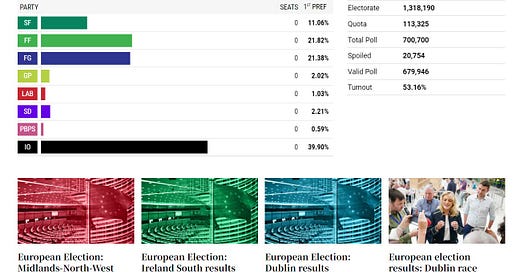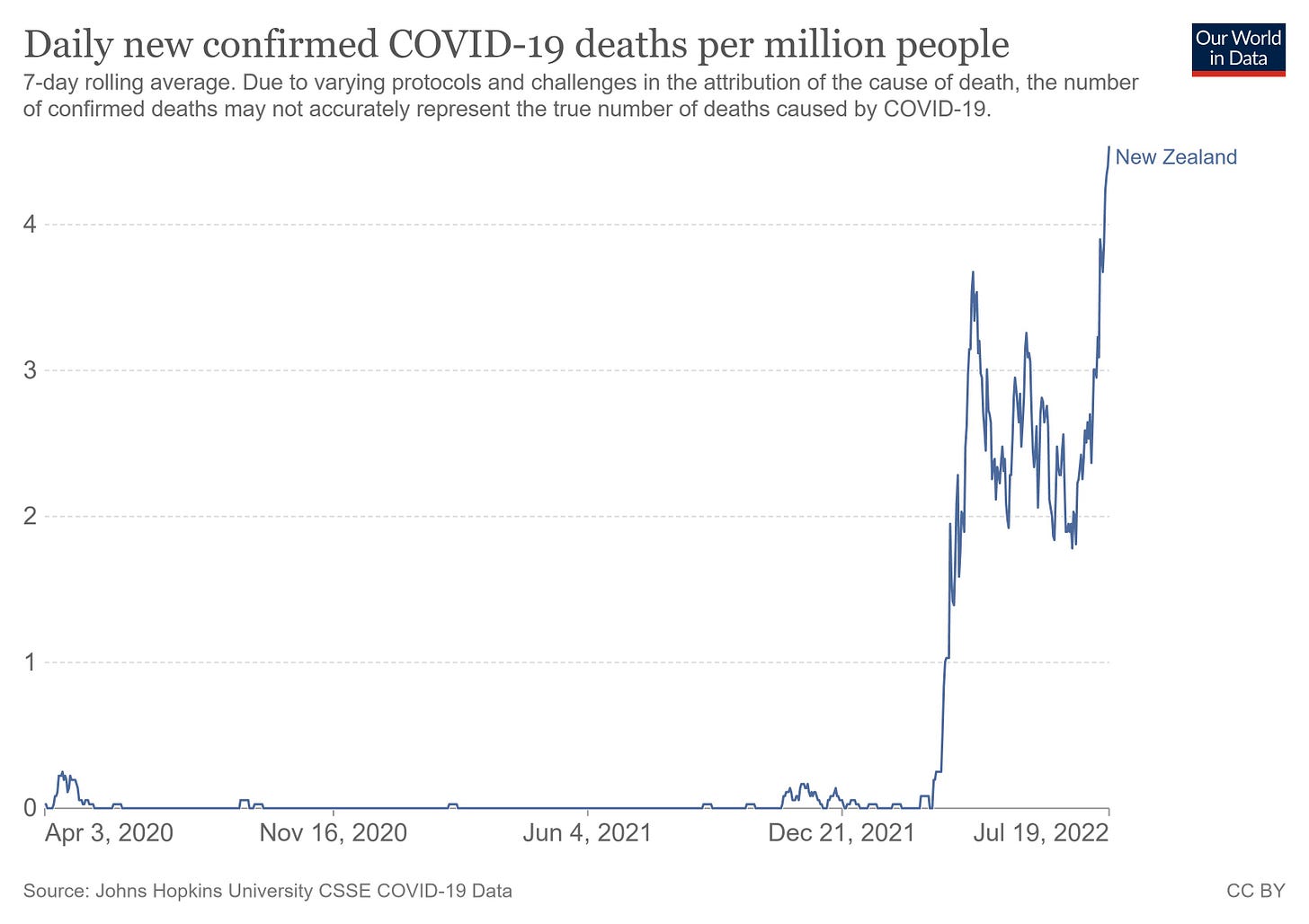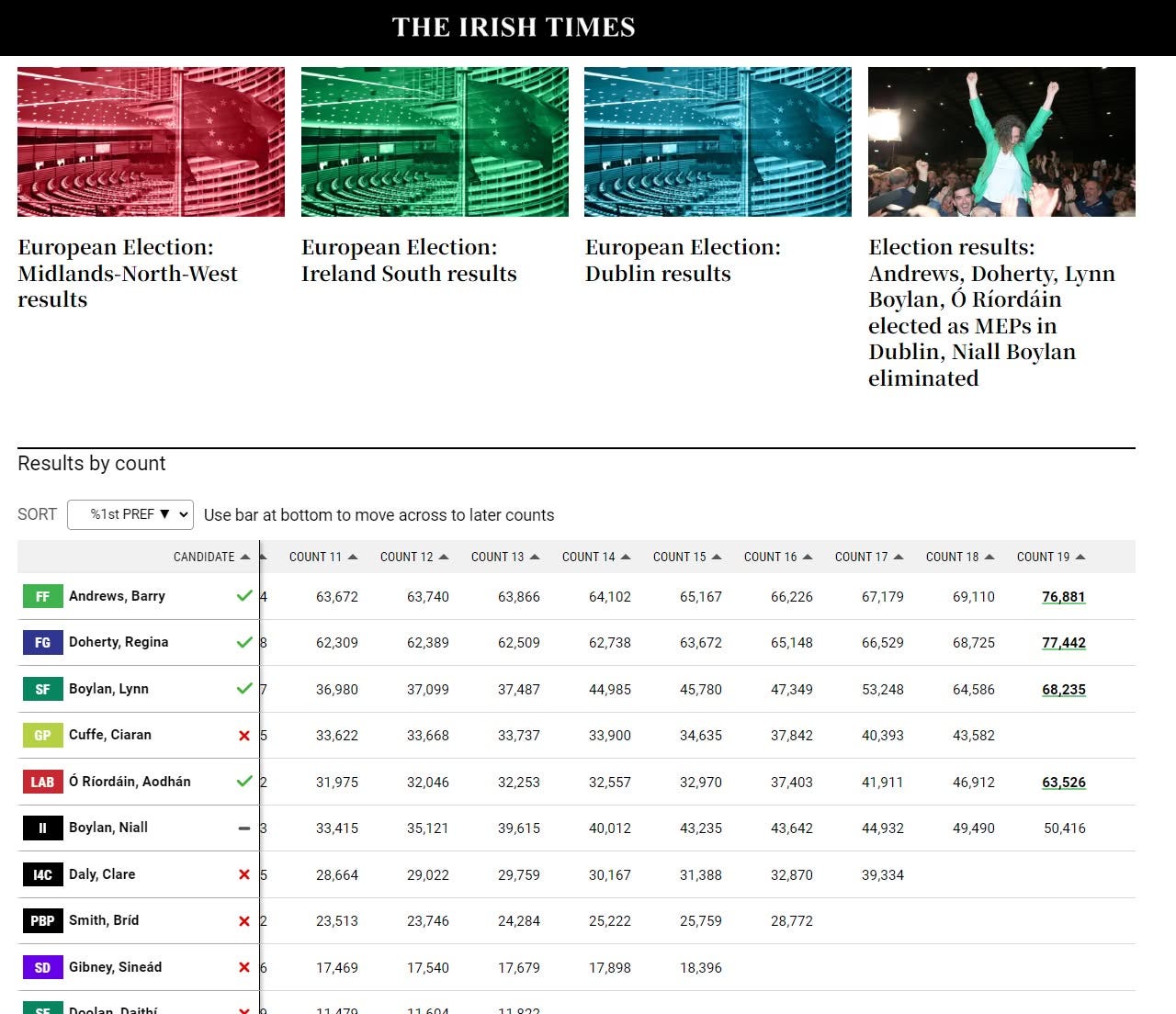Desperately Seeking Clues from the European Elections
In Ireland, the Green Party vote may have diminished, but it mostly diverted to globalist parties in the establishment.
Within the last few months, I saw a clip of comedian Shane Gillis in which he joked that Downsian people have it good. Among other things, “They’re not worried about The Election.” They’re just getting on with their lives and enjoying the simple things…. What’s wrong with the rest of us?
Meanwhile, the politics junkies among us have been all over the European Elections of the previous week—that is, all over the elections for membership in the European Parliament. Like, who cares? The European Parliament amounts to no more than a debate society, dun’nit? If even that. It might amount to no more than a platform from which members may inflict their rants on the universe. That said, it is hard not to believe that these European elections have attracted much attention, because it is reasonable to expect that actual elections amount to better indications of political trends than polls. Folks worried about forthcoming elections are sifting through the tea leaves and runes and cyphers looking for clues about where things may go.
Meanwhile, were it not for the European Parliament, I myself would never have become acquainted in years past with such formidable proponents of individual rights as Christine Anderson. Christine puts the “classical” and “liberal” in “classical liberal.” But, of course, the Borg hivemind of the establishment media dismisses talk of individual rights as “far right.” I would suggest that “counter-cultural” might be more apposite in our illiberal day and age.
Then there are—or have been—prodigious pro-Hamas ranters like that duo from Ireland, Mike Wallace and Clare Daly. They expend much of their energies preaching to other countries about how they should organize their affairs, and I imagine that the intersection of my policy preferences with those of either of these two people would be very small, but Clare is an excellent speaker. (Here she frames a matter in a manner in which I can agree, and it involves explicitly not interfering in another country’s affairs.) She has presence on the platform. (Clare was edged out of re-election as of June 11. It was a close-run thing. Meanwhile, it is looking like Mick might just squeeze back into the European Parliament.)
But, Ireland. What’s the matter with Ireland? More generally, what is wrong with the Anglosphere and the Celtic Fringe? Pathologies may have been stewing for some decades, but the COVID nonsense really got things going, and many observers puzzled about what was going on in the Anglophone world and in the Celtic Fringe.
In the early going, Australia and New Zealand inspired the greatest puzzlement. The premiers of the Australian state of Victoria (which encompasses Melbourne) and the Northern Territory became notorious for imposing the most severe lockdown measures and vaccine mandates.
But, admittedly, the entire Anglophone world seemed to catch fire. Canada and New Zealand did not favorably distinguish themselves. It was Canada, for example, that pioneered the business of “debanking” protesters of COVID policy, denouncing them as Nazis, and imprisoning them all in the way of saving Our Democracy™. Under the leadership of Jacinda Ardern in New Zealand, the government presented itself as your “single source of truth.” Data on vaccine failures had to be suppressed, but – guess what? – it was only after the vaccine rollout that COVID fatalities in New Zealand really got going. Hmm …
But, back to the Celtic Fringe. Early on I somehow caught on to the musings of Irish journalist John Waters. John, I am sure, would present himself as a Man of the Left straight out of the 1970’s. But, it might have been his experience covering—or, at least, observing—judicial proceedings involving family matters through which he might have been slipped a red pill. Discrimination against men in child custody matters seemed to influence his perception of the state to subordinate individual rights to ideological endeavors. I think I have that right …
The COVID madness really got John going, but, to this day, his COVID skepticism seems to remain a minority view. Meanwhile, Ireland remains caught up with its own experiences with mass, uncontrolled immigration, with the entire gender-queer business, and with globalism. Have the European elections revealed anything about these things?
I’ve taken some time to review the platforms of the major parties in Ireland, and I’ve been tracking commentaries for some time. My view of policy preferences across the Irish electorate remains coarse and unsophisticated, but, as of right now, I would be inclined to cluster voters into four groups:
(1) The Globalist Establishment:
It is pro-European Union, and thus pro-Ukraine and anti-Russia. Members seem to have held off commenting on the Gaza war, but, if pressed, they’d come out as pro-Hamas. They were enthusiastically all-in on the COVID hysteria, and they’re in favor of the WHO pandemic treaty. They’re also all-in on climate hysteria and quietly in favor of unlimited immigration. They’re all-in on the Gender-Queer business. They love impotent but costly public initiatives to deal with issues like the affordability of housing, because more public policy amounts to more power.
(2) Old School Nationalists:
They actively oppose uncontrolled immigration, and may maintain a laissez-faire view of public policy. They just want to be left alone. That said, they might oppose abortion access. There are some strong, nationalist currents that swirl around the idea of unification with “Norn Iron.” Some members might reveal a latent, Old School anti-Semitism in that folks might off-handedly volunteer the idea that the “Jews control everything.”
An outsider might be surprised to learn that this cluster does not include Sinn Féin—remember them? Those were the people who used to be virulently nationalist and had managed to assassinate British political figures like Louis Mountbatten (1979) and had made some nearly-successful attempts to assassinate Margaret Thatcher. But, they’re part of the Globalist Establishment now, with Pride Flags and all.
(3) Old School Soviet Utopians:
They are pro-European but decry the EU leadership of the European project. They oppose the war in Ukraine and aspire to the Soviet-style dream of Utopia. They place great stock in public policy initiatives, because they believe public policy really can illuminate the shining path to the idealized Soviet Utopia. They’re virulently anti-Israel and pro-Hamas.
(4) Everyone else who finds himself puzzling over the evaporation of individual rights, the evaporation of national sovereignty, the enthusiasm for war in Ukraine, and (possibly) the anti-Israeli sentiment.
* * *
What do the European elections reveal? The elections may have inspired the Borg hivemind of the establishment media to fret about the advance of the “far right” on Continental Europe, especially in France. Part of the fretting also seems to involve the whittling down of the Green Party contingent, especially from Germany. Overall, however, the globalist establishment seems to have fared well. In Ireland, the independent, anti-globalist (“far-right”) parties and candidates did not really advance, and some of the vote for the Greens diverted to the establishment, globalist parties.
John Waters put himself up as a genuine, unaffiliated independent for one of the five slots open in the “Midlands-North-West” cluster of counties. His long-shot bid got some traction but ran out of steam after 11 rounds of vote counting. Which does prompt an outsider to wonder: What is this business of going through several iterations of vote counts?
The vote-counting process in Ireland has some flavor of ranked-choice voting. As far as a I can tell, a voter has the option of ranking all candidates for a given office. So, for example, the vote to send four candidates from the Midlands-North-West of Ireland to the European Parliament involved 27 candidates. A voter has the option of ranking any subset of these candidates. Thus, a given voter might only indicate a preference for a single candidate, might indicate rankings for some other subset of candidates, or might go ahead and rank all candidates.
In the first iteration of vote counting, the authorities sum all voters’ top-ranked choices. A given candidate might secure a sufficiently large mass of voters’ top choices to secure one of the five seats. The “Southwest” cluster of counties, for example, also featured five seats, and one candidate did secure just over one-sixth of the top choices, and thus secured one of the seats. Alternatively, no candidate may secure a margin of votes that would guarantee a slot. In the next iteration the mass of next-preferred votes from either a winning candidate or from the candidate that performed worst in the previous iteration are allocated to all surviving candidates. Again, either a winner or a loser is identified. Next-preferred votes get allocated to surviving candidates, and this process proceeds until five candidates secure a threshold number of votes. Conceivably, an election with N candidates for M slots could go through N-1 iterations. I think that’s right: Conceivably, M-1 candidates could secure winning thresholds by the slimmest of margins thus leaving it to two candidates make it all the way to the N-1th iteration.
John Waters’s bid fell out after 11 iterations in an election featuring 27 candidates. (This was a big enough deal that the Irish Times made a point of featuring the result in a headline.) Meanwhile, in the “Dublin” area, Clare Daly’s bid fell out after 17 iterations in an election featuring 23 candidates competing for 4 seats. She came in 7th place. In that same “Dublin” election, the anti-globalist candidate Niall Boylan came in 5th place, thus just losing out in the race for the 4th and last seat, but the contest made for a quite an exciting horse race, because the 6th place finisher was the Green Party candidate Ciaran Cuffe. As he dropped out, where would his next-preferred votes be allocated? No surprise those votes favored the remaining establishment candidates and not the political gadfly Niall Boylan. Establishment, globalist parties secured all four seats from the Dublin area.
Let me pose this hypothesis: The mass of first-round votes going to independent candidates encompasses nearly all of the anti-globalist sentiment in the Irish electorate. Consider the following images all from the Irish Times:
In the graph above, “IO” indicates the share of first-round votes that went to “independent” parties and candidates. Such parties would include Independents 4 Change (the party of Mick Wallace and Clare Daly). “IO” would also include unaffiliated candidates like John Waters.
In the “Dublin” region, 28% of validated 1st-iteration votes went to independents. I am going to suggest that not more than 28% of the electorate disfavors the globalist agenda. But what of the two other voting regions? In the “Midlands-North-West” (John Water’s region), nearly 40% voted “independent”; a larger share of voters appear to disfavor the globalist agenda. In the “South” region (Mick Wallace’s region), independents secured just over 30% of the first-iteration vote. Overall, 34% of the mass of votes for top-preferred candidates went to independent candidates and parties. I am going to suggest that not more than 1/3rd of the electorate disfavors the globalist/queer/climate-change agenda. So, the Green Party’s share may have declined, but the country remains mostly in the grasp of the Establishment. But the grasp is contestable. Next man up.






